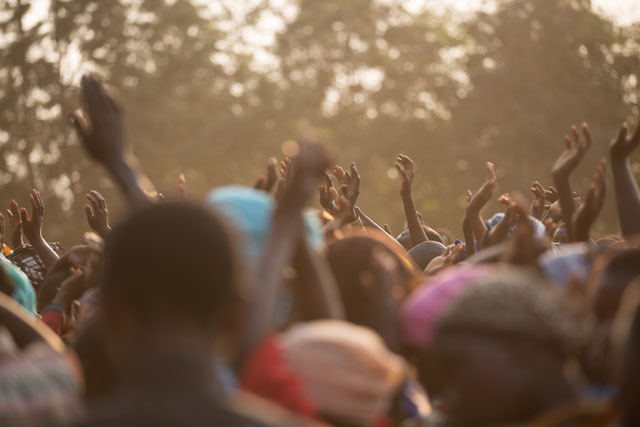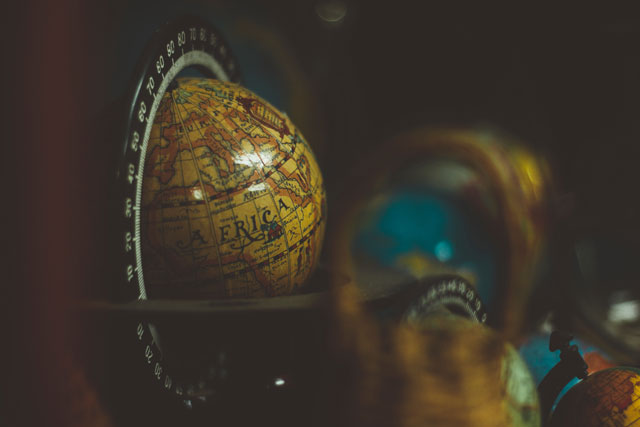Women at Work: Margarita Fourer and Tahlia Dwyer

Today marks an important day in the calendar year - International Women’s Day (March 8). A ‘global day for celebrating the social, economic, cultural and political achievements of women, it is also a call to action for accelerating gender parity.’
In 2016, the University of Canberra was awarded its tenth consecutive citation as an Employer of Choice for Gender Equality. It continues to commit to diversity and inclusion in the workplace, by closing the gender gap at all levels. UC has helped shaped the lives and careers of many talented and successful women ranging from politicians to scientists, journalists and nurses.
To celebrate International Women’s Day we speak to two University of Canberra alumnae, Margarita Fourer and Tahlia Dwyer. Graduating with a Bachelor of Laws, Margarita and Tahlia are both working across the globe in Africa, where they are dedicated to helping refugees and fighting for basic human rights for those without a voice.
What has been your career path since graduating from the University of Canberra?
Margarita: As part of my last subject at UC I participated in an Internship at the Australian Human Rights Commission during the time that they initiated their 2014 inquiry into Children in Immigration Detention. This led me to writing an independent submission into the inquiry on the right of children to play.
I left my job in Australia to go to Europe while I completed a Master of Law at Groningen University in the Netherlands. Upon finishing my LLM, I travelled to Israel, where I gained practical experience as a volunteer relocation caseworker at an organisation called African Refugee Development Centre, which assisted the African population in Israel to reunite with their families in other parts of the world.
While completing a paid PhD research grant, I started as a Resettlement Officer at the African Regional Deployment Unit (ARDU) in Church World Service (CWS), where I was deployed to the UNHCR Office of the Dadaab refugee camp and am now based in Nairobi, Kenya.
Tahlia: After finishing my degree I started in the Graduate programme at the Department of Immigration and Border Protection (DIBP), before being promoted to a Legal Officer position in the Legislation team.
After two years at DIBP, I spent six months volunteering at a refugee legal centre in Israel, which is home to 60,000 African asylum seekers. My job there was to assist them in applying for refugee status and draft appeals when their cases were rejected. From there I spent 12 months as a Refugee Status Determination Officer at UNHCR Cairo, where I interviewed asylum seekers to decide if they fit the criteria and should be granted protection. Since then I have been working for UNHCR in Uganda as a Resettlement Expert.
Where are you currently working? What does a typical day involve for you?
Margarita: I am now working in Kenya as an ARDU Supervisor, helping coordinate the deployment of ARDU Resettlement Officers to refugee camps across Sub-Saharan Africa. As a Resettlement Officer, a typical day is interviewing applicants and writing up and resubmitting their resettlement forms, with lots of steps in between.
Currently my role is more administrative and it is to ensure that all of the Resettlement Officers are supported and are not impeded from doing their job to the utmost of their capacity.
Tahlia: I’ve spent the last year working in a Refugee Camp in Uganda, where my job is to identify refugees that may be eligible to be resettled in another country such as the USA, Sweden or Australia. A typical day involves interviewing a family, to collect information about who they are, where they are from and why they can’t go back.
After the interview I then write a referral to submit to a resettlement country, including information about the reasons the individuals cannot return to their home country and why they cannot stay in Uganda. Often these cases involve people that have suffered violence and torture in their home country, or single mothers, who are at risk of exploration in Uganda.

What is it like living in Africa compared to Australia? Have you experienced any culture shocks?
Margarita: Nairobi is a very liveable city with a vibrant cultural and night life. And there are plenty of opportunities to get away for the weekend for a safari, hike or a trip to the coast. The biggest incongruity that took me a while to get used to is the visible wealth divide.
You can see that Nairobi is a growing, thriving city. There is construction of brand new shiny corporate office buildings going on all across town. But if you stop looking up, and stare at your feet, the roads that pass past those brand new buildings are full of potholes, lined by dirt footpaths.
And while there is certainly a growing middle class in Kenya, it is truly upsetting to see that so few Kenyans reap the benefits of the visibly enormous amount of wealth and investment coming into the country.
Tahlia: Living in a refugee camp is fairly challenging and takes getting used to. It can be quite isolating, so you really need to have a routine, and make regular Skype dates with family and friends. When I first arrived in the camp I found it quite confronting to see how people were living. It makes you really think about how fortunate we are in Australia.
I am lucky get to go back to the capital city, Kampala every weekend. Kampala is a fairly modern city with lots of good restaurants and bars, so I don’t miss out on too much. The one thing that drives me crazy is the traffic. The only way to get anywhere in the city is by motorbike, otherwise you will be stuck in traffic for hours every day.
Working with individuals that have been affected by poverty, war, hunger and disasters can be a very mentally and emotionally challenging job. How do you find the inspiration and strength each day to keep working towards your goals?
Margarita: In this line of work it is a funny aspect that you are simultaneously exercising your humanity and putting it on hold. By this I mean that in order to hear and see the horrible stories and situations of the refugees, you have to not let it get to you. If you do let it get to you then you stop being effective in your work. You need to find that inner strength and keeping moving forward to do the little things that you can do to help these people.
Tahlia: Even though it’s tough listening to refugees tell me about what they have experienced, without this information we can’t submit their case for resettlement to another country. The best thing I can do is remain professional so that I can get the information I need to submit their case, and so that they can feel comfortable telling me their past experiences. Seeing people depart the camp to start new lives in the USA or Australia, for example, makes it all worth it.

(Margarita Fourer, Tahlia Dwyer)
What are some of the biggest life lessons you have learnt during your career?
Margarita: Nothing ever goes to plan. Ever! While long term goals need not change (unless you want them to of course), you need to be flexible about how you will arrive at them. And importantly, you have to be ready to pick yourself up, dust yourself off and try again, and then again, and again. I sent out about 60 job applications to organisations in over 10 different countries and heard nothing for months, until I landed four of those jobs in the space of two weeks. Persistence is key.
Tahlia: There are so many lessons I have learnt from working with refugees. Their resilience and optimism astound me every day. One of the main things I have learnt is that small gestures can make such a difference in a person’s life.
For most refugees, they will never be resettled to another country, and they will remain living in a refugee camp for many years, often generations until it is safe to go home. In this sense, the scale of the problem can be overwhelming. But on a day to day basis, small things like taking time to listen to someone’s story, treating people with dignity, or even offering someone a cup of tea and a safe space to sit and chat makes such a difference.
It’s a big decision to leave Australia to work overseas; do you have any tips or advice for someone thinking about making the move?
Margarita: Working overseas was not a big decision for me. It was something I had dreamed of doing for years and all my studies and savings were aimed at allowing me to do that. While there are many ways in which you can work overseas, I suggest doing a lot of research about your field and what is required.
Ask lots of people lots of questions about how to enter your field in the country you want to go to, and then ask them for the name of another person that they know so that you can ask the same advice from. Eventually, you will come across a way that works for you.
Tahlia: I don’t think moving overseas is a hard or as scary as people might think. Reach out to people you know that may have lived where you are going, and who can introduce you to other people living there. Also, be open to new opportunities; don’t be afraid to change your plans once you get overseas.
Words by Stephanie Cossetto, images courtesy of Margarita Fourer, Tahlia Dwyer and unpslash.com
Margarita Fourer
Bachelor of Laws, University of Canberra (2014)
Margarita Fourer graduated from the University of Canberra with a Bachelor of Law in 2014. After completing an internship with the Australian Human Rights Commission, she travelled to Europe where she completed a Master of Law at the Groningen University in the Netherlands.
While writing a PhD, she began working as a Resettlement Officer at the African Regional Deployment Unit (ARDU) in Dadaab. Margarita now works as an ARDU Supervisor in Nairobi, Kenya. You can connect with Margarita via LinkedIn.
Tahlia Dwyer
Bachelor of Laws, University of Canberra (2012)
Tahlia Dwyer graduated from the University of Canberra with a Bachelor of Law in 2012. She began working at the Department of Immigration and Border Protection (DIBP) in the graduate program, before working as Legal Officer in the Legislation team.
Tahlia spent 6 months volunteering at a refugee legal centre in Israel, before spending twelve months as a Refugee Status Determination Officer at UNHCR in Cairo. She currently works as a Resettlement Expert in Uganda.

